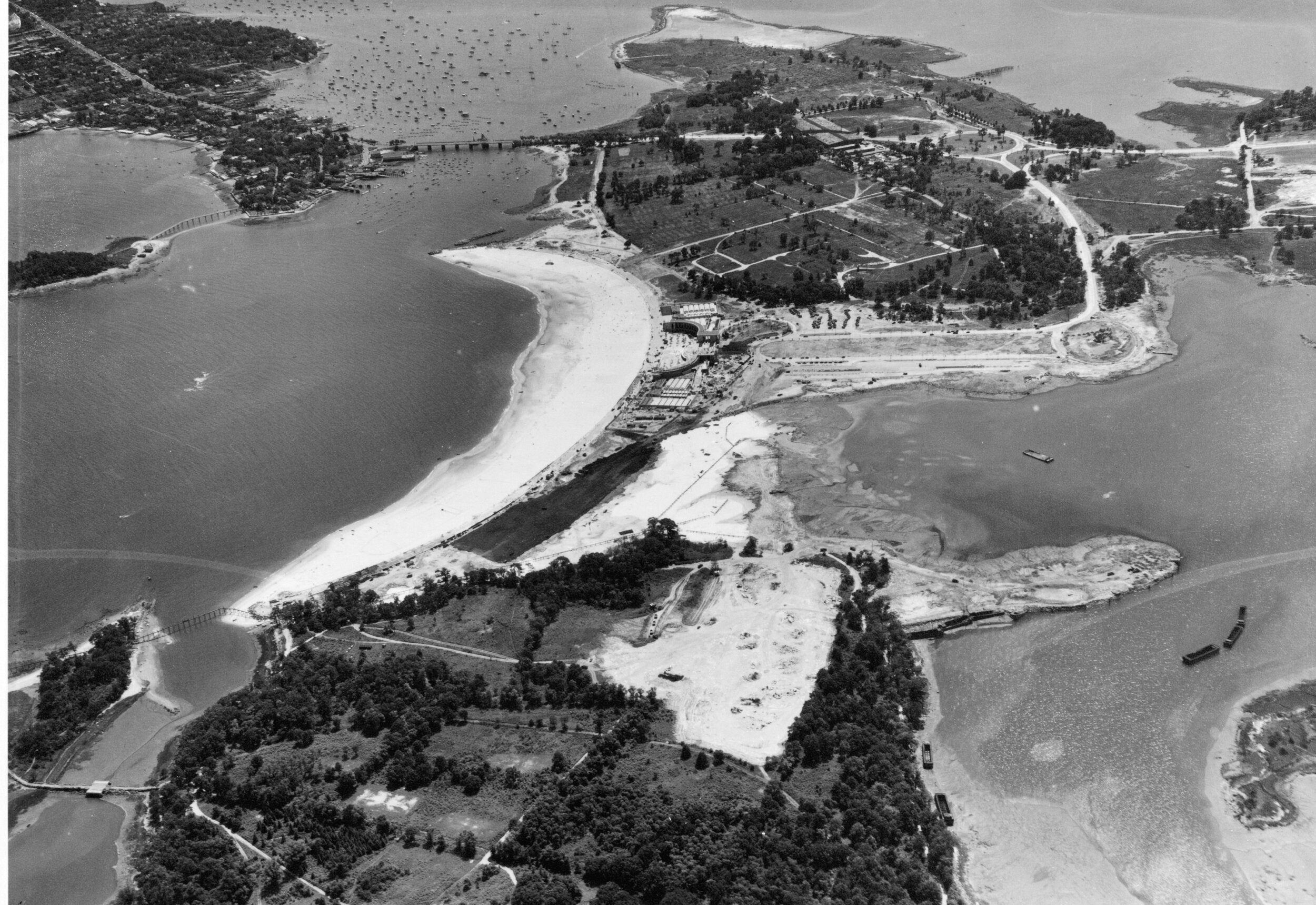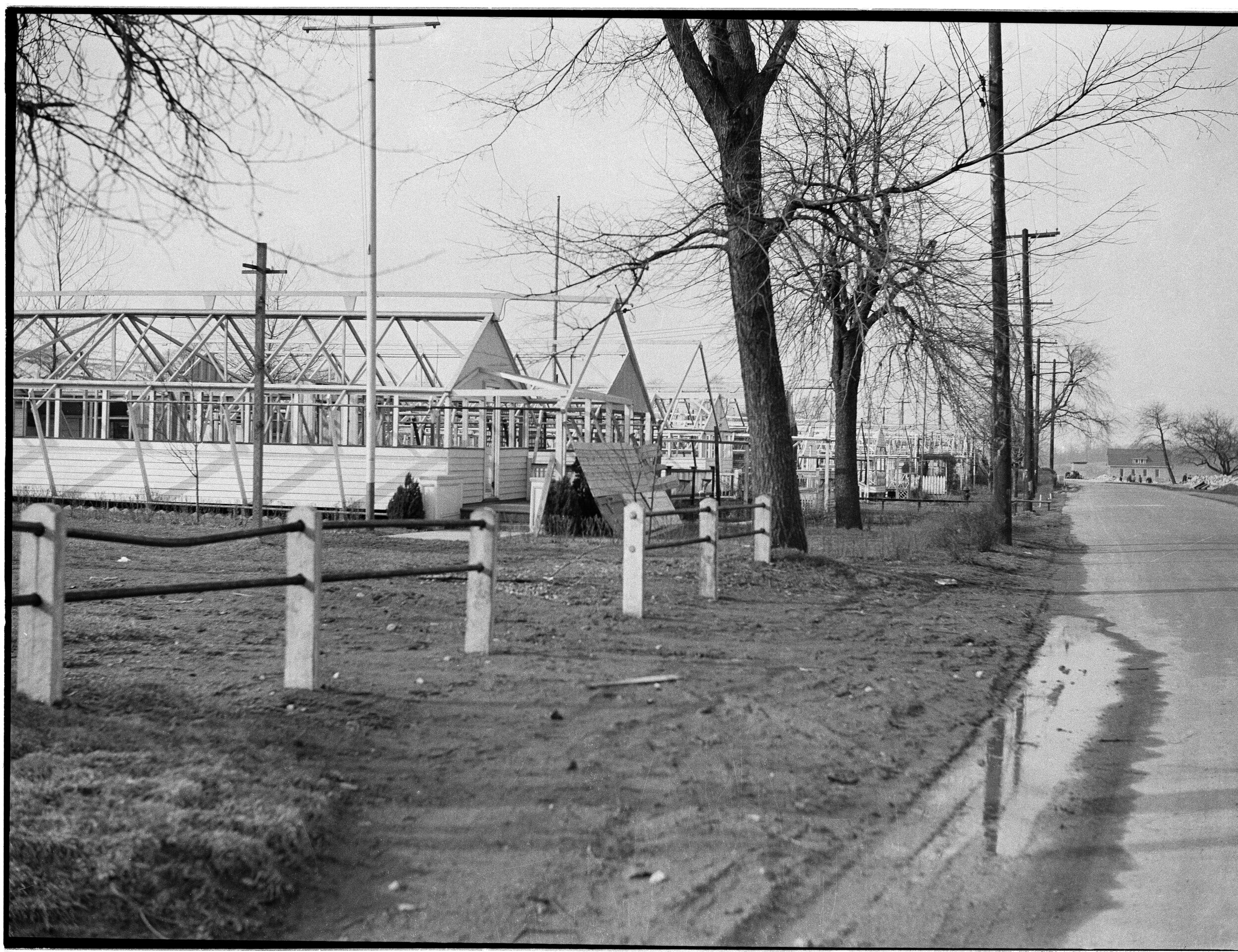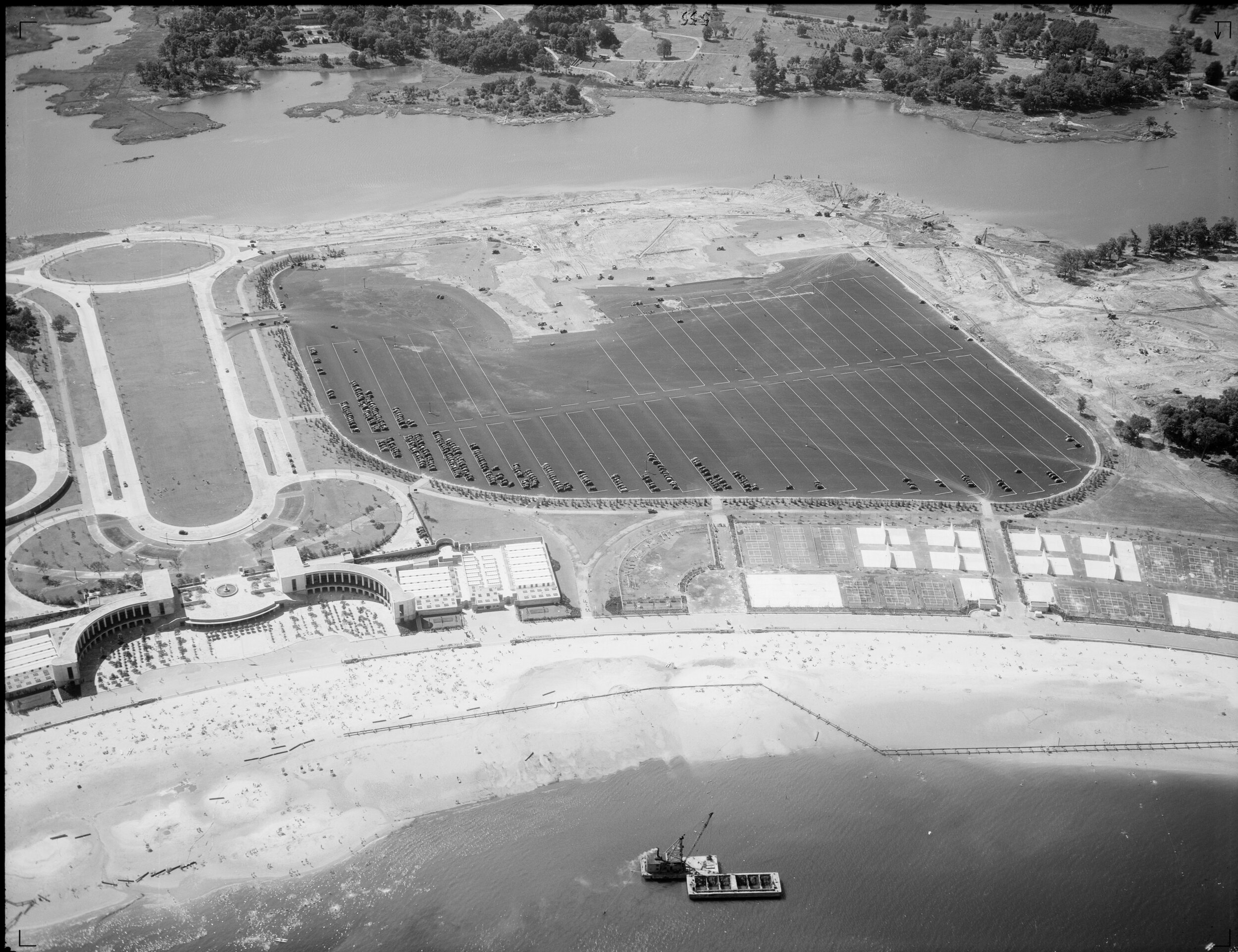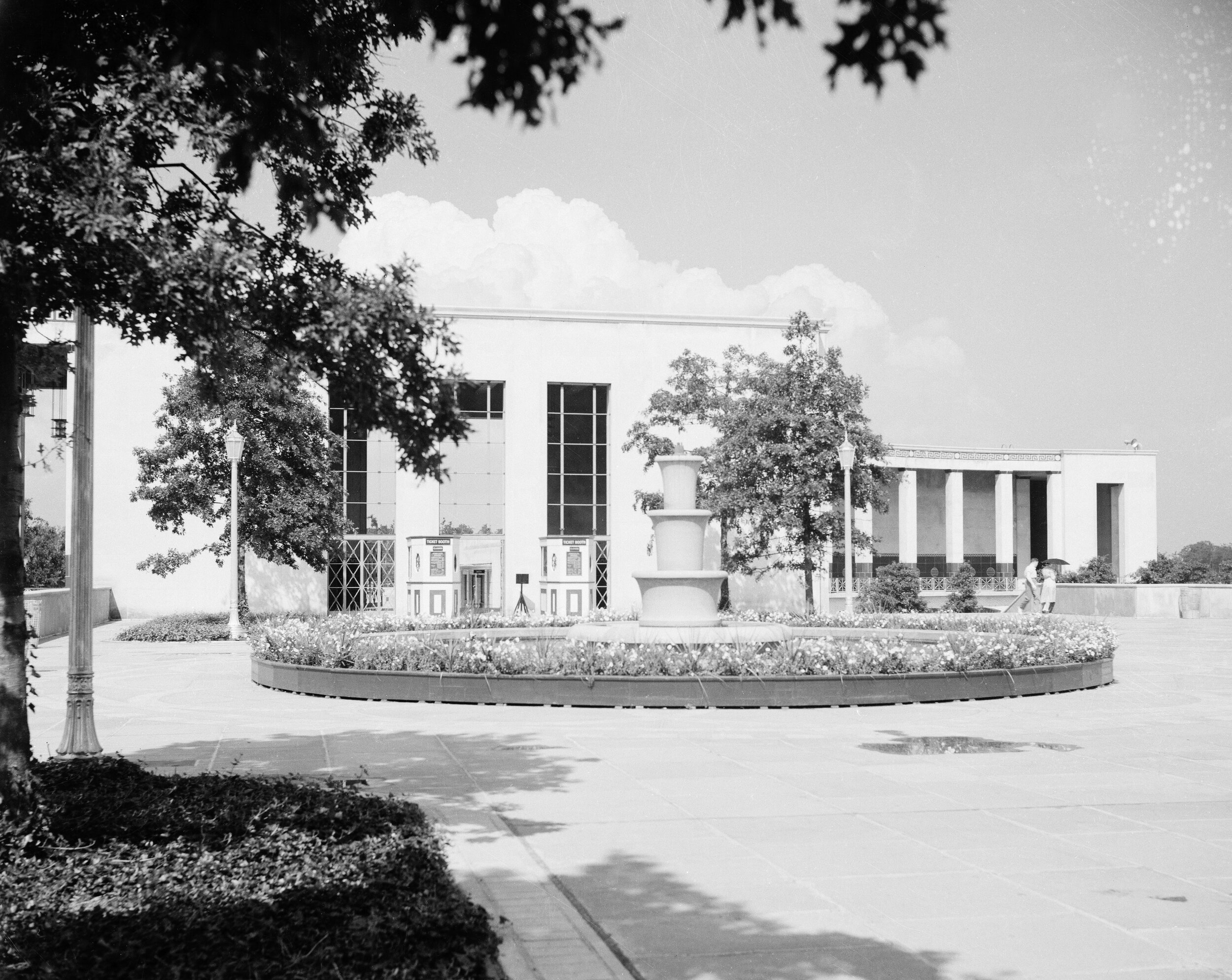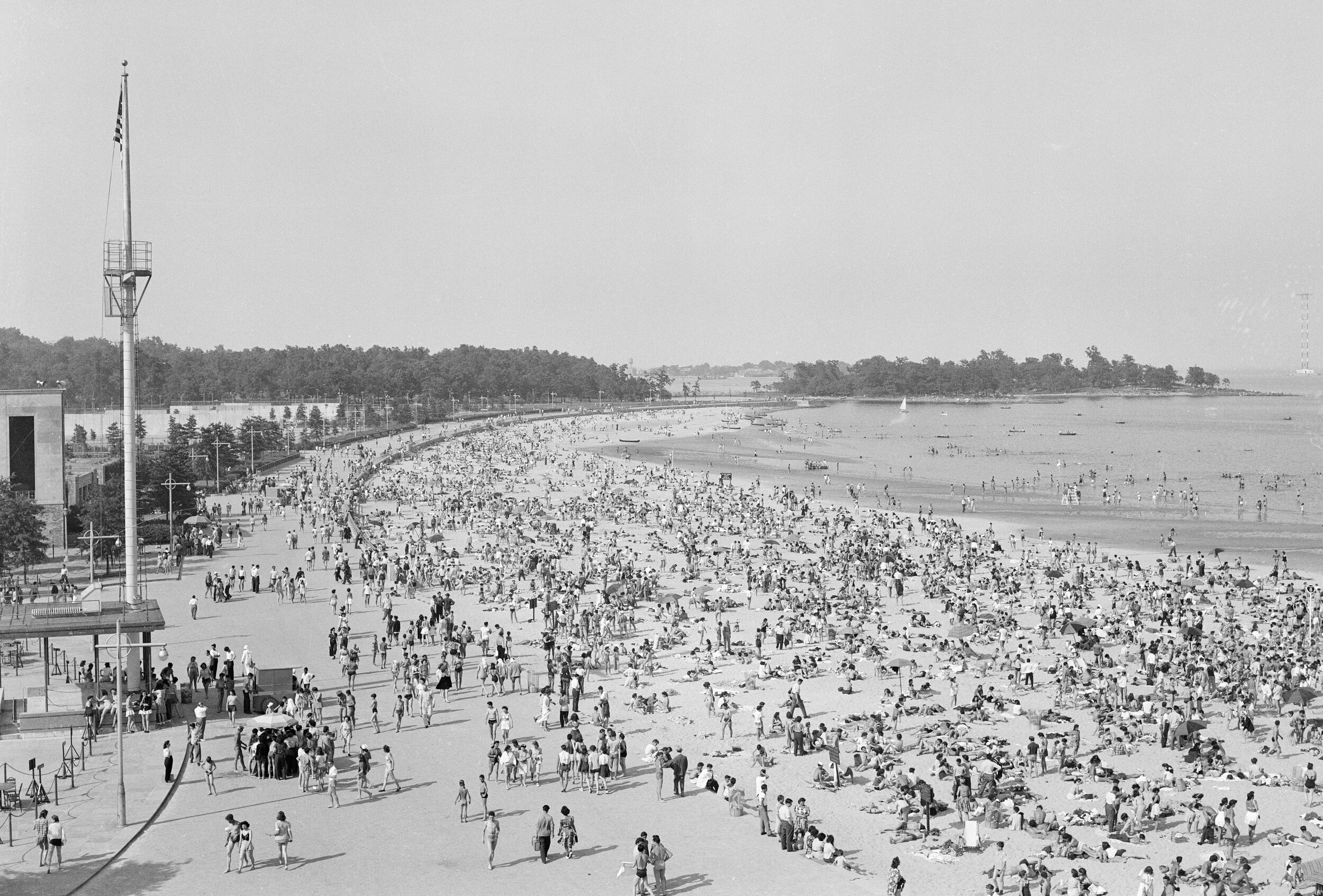New Yorkers may remember the 2020 Memorial Day weekend as the year they did not go swimming at City beaches. In the ongoing effort to contain the spread of the Covid-19 virus, City beaches will remain closed to many beach-goers, including swimmers, on what is the unofficial start of summer. Perhaps they will open later in the summer when it becomes safer.
Can’t swim in the ocean? The two million pictures in the Municipal Archives photograph gallery are always a good distraction.
Orchard Beach, aerial view, June 15, 1937. Still under construction in the summer of 1937, a year after its official dedication, the white sands of the new 1.06-mile crescent-shaped Orchard Beach connected Hunter Island (foreground) with Rodman’s Neck. Parks Commissioner Robert Moses disliked the pebbly gray sand of Long Island Sound and had the fine white sand of the Rockaways dredged and hauled by barge to his new beach in Pelham Bay Park. Department of Parks and Recreation Collection. NYC Municipal Archives.
Bathhouses, Pelham Bay Park, April 9, 1934. Pelham Bay Park had been a popular summer destination with hundreds of bungalows and bathhouses. Department of Parks and Recreation Collection. NYC Municipal Archives.
Searching the gallery for “beach” photographs brought up dozens of evocative images—many, not surprisingly—in the Department of Parks and Recreation (DPR) collection. And of those, the vast majority document the work of Robert Moses, New York’s legendary “Master Builder.” Appointed by Mayor Fiorello LaGuardia as Commissioner of the Department of Parks in 1934, Moses served through four mayoral administrations until 1960. Widely criticized today for destroying neighborhoods by routing highways through them, Moses also was responsible for creating pools, parks and beaches throughout the five Boroughs.
This selection of photographs from the gallery features Orchard Beach, one of eleven new swimming pools and beaches Moses opened in the summer of 1936. Located on the east side of Pelham Bay in Pelham Bay Park, Orchard Beach was built with millions of federal Works Progress Administration dollars and workers. Often called “The Bronx Riviera,” Orchard Beach is a superb example of Moses’ reputation for superior design and ‘getting things done.’
Federally-funded WPA workers demolish existing structures and the retaining in Pelham Bay Park, April 9, 1934. Department of Parks and Recreation Collection, NYC Municipal Archives.
Mayor Fiorello LaGuardia and Parks Commissioner Robert Moses (seated at right), at the dedication ceremony for Orchard Beach, July 25, 1936. Department of Parks and Recreation Collection. NYC Municipal Archives.
Although only one-third completed, Orchard Beach was the eighth of eleven new city aquatic recreational centers formally opened during the summer of 1936. In his remarks at the dedication ceremony Mayor Fiorello LaGuardia addressed those who denounced the WPA relief program as a wasteful ‘make work’ government boondoggle: “We have heard of criticism from time to time of relief work as a way of meeting depression problems. Well, I believe relief work has become an American institution. It is the American way of meeting the emergency relief problem. It is a way of treating the relief problem in a sound and sensible way, in that it gives the community something in return for aid which it extends.”
The “something in return” the Mayor saluted that July morning would eventually include an 8,000-car parking lot, a magnificent bathhouse with locker rooms, restaurants and shops, plaza, and boardwalk as well as parkland, nature trails, picnic areas, playgrounds, an athletic field, tennis courts, boat harbors, and the beach itself.
Aerial view of Orchard Beach, the pavilion and vast parking lot, June 24, 1938. Department of Parks and Recreation Collection. NYC Municipal Archives.
Orchard Beach Pavilion, April 4, 1939. Department of Parks and Recreation Collection. NYC Municipal Archives.
Architect Aymar Embury II (1880-1966) designed the 200,000-square foot pavilion as the centerpiece of the beach complex. Moses had wanted it to blend in with the hilly, wooded landscape behind it and had to plead with the WPA for approval of Embury’s colonnaded classic design solution. Embury went on to collaborate with Moses on several other projects including the Central Park Zoo, Prospect Park Zoo, and Jacob Riis Park.
In 2006, the Landmarks Preservation Commission designated Orchard Beach as a landmark calling it “among the most remarkable public recreational facilities ever constructed in the United States.” In the designation report, Landmarks described the concrete, brick, and limestone bathhouse: “… embellished with tile and terrazzo finishes, [it] features two monumental colonnades that radiate outward from a raised central terrace. The crescent-shaped promenade, which follows the curve of the beach, is paved with hexagonal blocks and edged by cast-iron railings evoking a nautical motif.”
Orchard Beach Pavilion upper terrace, June 15, 1940. Department of Parks and Recreation Collection, NYC Municipal Archives.
Boat harbor, Orchard Beach, 1939. Rowboats available for rent by the hour were another amenity for Orchard Beach visitors. Department of Parks and Recreation Collection, NYC Municipal Archives.
Arriving for a day at Orchard Beach, 1939. Department of Parks and Recreation Collection, NYC Municipal Archives.
Shorts and a t-shirt would not have been considered appropriate attire for the journey to the beach in the 1930s. Beach goers were expected to bring their bathing suit, or rent one, and change in the bathhouse, using one of the 5,000 lockers to check their clothes, or risk a $5.00 fine if caught slipping into their trunks in the bathroom. Other rules forbade sitting on a newspaper on the sand to prevent the inevitable litter. Offenders were tried within hours at a special court.
Concession building, Orchard Beach, 1940. The nautically clad sales staff at the beach shop offered model sailboats, Kewpie dolls and big straw hats. Department of Parks and Recreation Collection, NYC Municipal Archives.
Concession area, Orchard Beach, September 10, 1940. Embury’s Moderne-style is evident in the concession interior. Department of Parks and Recreation Collection, NYC Municipal Archives.
Crowded summer beach scene, Orchard Beach, circa 1940. Department of Parks and Recreation Collection, NYC Municipal Archives.
An extraordinary achievement, Orchard beach provided wonderful recreational opportunities for Depression-weary City residents. Today, we look forward to the day we can once again “dive in” at the beach.
